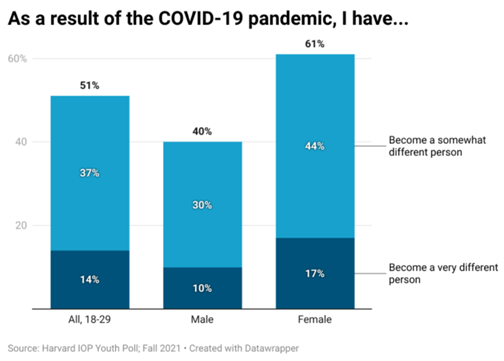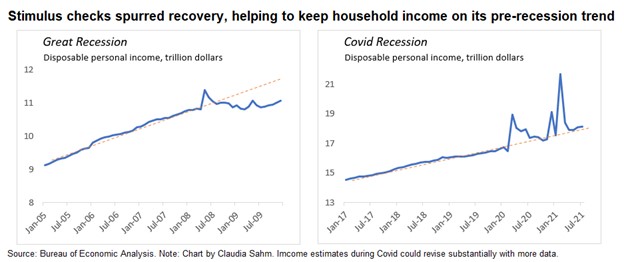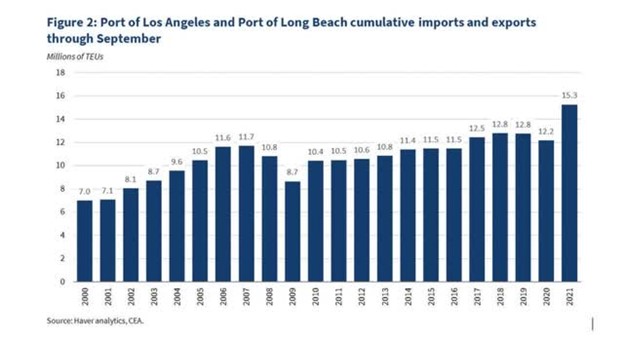The Daily Escape:

Sunrise with moon, Utah Lake, UT – December 2021 photo by Karen Lund Larsen
Bloomberg reported on Monday that the US economy is outperforming the world by the biggest margin in the 21st century. Surprisingly, they say that there’s a good reason:
“America’s economy improved more in Joe Biden’s first 12 months than any president during the past 50 years…”
They say that the objective economic data are pretty convincing about the Biden Boom of 2021, notwithstanding the contrary media narrative that seems to be driving poor public opinion. Biden is either in first place compared to recent American presidents, or at number 2 on all the big economic indicators, says Bloomberg’s Matt Winkler:
“Exceptional returns…especially the S&P 500 Index in both absolute terms and relative to its global counterparts, can be attributed to record-low debt ratios enabling companies to reap the biggest profit margins since 1950. Corporate America is booming because the Biden administration’s Covid-19 vaccination programs and $1.9 trillion American Rescue Plan reduced the jobless rate to 4.2% in November from 6.2% in February, continuing an unprecedented rate of decline during the Covid-19 pandemic.”
Also, inflation-adjusted GDP surged at an average annual rate of 5.03% in each of the first three quarters of 2021 and is poised to hit 5.6% for the year based on the preliminary estimates of more than 80 economists surveyed by Bloomberg. If that forecast holds up, it would be more than 2.8 times the average performance between 2000 and 2019. And double the average since 1976.
More from Bloomberg:
“All of which makes Biden’s first year in the White House the standout among the seven previous presidents, based on ten market and economic indicators given equal weight. According to data compiled by Bloomberg, no one comes close to matching Biden’s combination of No. 1 and No. 2 rankings for each of the measures:
Gross domestic product (1)
Profit growth (1)
S&P 500 performance (2)
Consumer credit (1)
Non-farm payrolls (2)
Manufacturing jobs (2)
Business productivity (2)
Dollar appreciation (2)
S&P 500 relative performance (2)
Per capita disposable income, which rose 1.08% this year, is the only comparable weakness for Biden, trailing Donald Trump’s 2.17%, George W. Bush’s 2.01%, Jimmy Carter’s 1.80% and Ronald Reagan’s 1.42%.”
GDP growth in year one of each new administration during the past four decades had never exceeded 2.74% until 2021. Bloomberg goes on to say that Biden might surpass Carter (5.01%) as the GDP growth champion of presidents since 1976.
Much of the credit goes to The American Rescue Plan, which poured $66 billion into 36 million households. The child tax credit reduced the child poverty rate by 50%, helping the US recover faster from the pandemic than most other nations.
That’s the same child tax credit that just expired, and that Sen. Joe Manchin is vociferously against.
The downside to those record corporate profits is that they are not being shared with workers. We know that in 2021 economic inequality got considerably worse, even with Biden’s recovery act putting $ billions in the pockets of American families.
Like Jimmy Carter, Biden now faces the political fallout of accelerating inflation. The NYT’s Neil Irwin wrote about how high inflation and the never-ending pandemic are depressing Americans’ attitudes about the economy. He adds that it’s easy to recall Carter’s inability to deal with inflation in the 1970s, until the Fed’s Paul Volcker threw the economy into a deep recession. Back then, Carter took the political fall for the Volcker policy. Reagan got full credit for the recovery.
Once again, fear of inflation is everywhere in the press, but as Wrongo wrote:
“Back in 1980, when then-Chair of the Federal Reserve Paul Volcker raised interest rates high enough to throw the US into a recession and end inflation, inflation had averaged 6.9% for the previous 11 years.”
And while inflation’s averaging 6.81% for this year, it isn’t comparable, because of the amazing growth in US GDP and corporate profits, along with the chronic product shortages due to supply chain issues.
But contrast today to December 1981, when Reagan had been president for 11 months, just as Biden is now. Conditions were substantially worse: The unemployment rate was 8.5% and would keep rising throughout 1982. Inflation was 8.9%, and consumer sentiment was in the tank.
People believe what they’re told by the press and pundits. That in part explains Biden’s low approval ratings, along with the GOP’s master class of blaming Biden for a disastrous economy that was really caused by Trump’s inaction on Covid.
Keep all this in mind. Overall, Biden’s doing a very good job with the economy.
Time for another Christmas season tune. Here’s a group of UK theater performers called Welsh of the West End performing the Mariah Carey classic, “All I Want for Christmas is You” on a zoom call. Perfectly appropriate for Christmas with Omicron:












